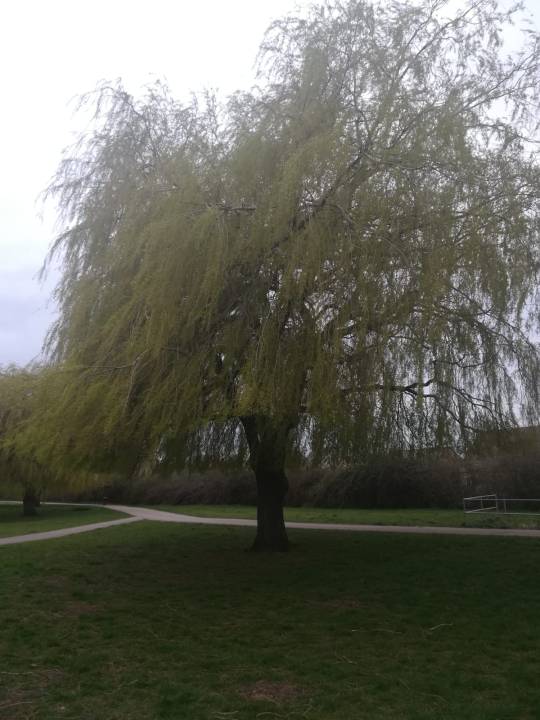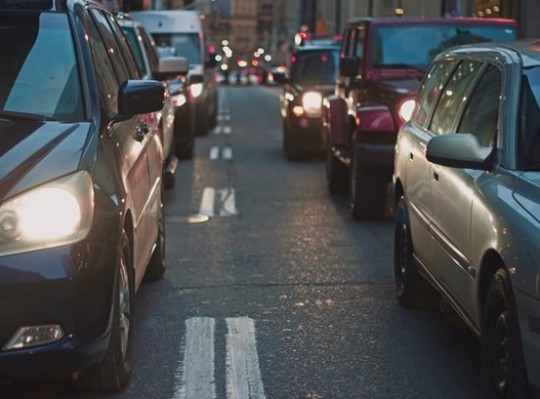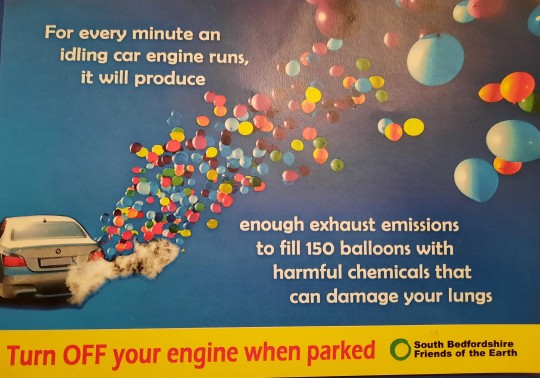Text
Think of the birds and the bees
Please think of the #birds and #bees and all lovelies - leave areas of long #grass, leave some #weeds, consider a #beetlebucket, a pile of #logs and #leaves and a shallow bowl for those who require a drink :-)
0 notes
Text
Have your say on the consultation
https://consult.defra.gov.uk/natural-environment-policy/consultation-on-environmental-targets/
0 notes
Text
What’s in a tree?
This is a plea, I am on my knees at your feet begging you,
look around you and understand and appreciate what you see.
Look at the detailing in a tree, the different shaped branches, the changing colour of the leaves,
the sound of birdsong, the sight of bird nests tucked between the naked branches.
Appreciate the time and effort that has gone into building those homes, making them safe through the year, to raise young in, as people do. They stay put through the changing seasons, through the windy days, through the pouring rain.
We have a duty to protect trees, we have no right to fell what is not ours to fell.
We have every right to protect them. They provide for us, it is about time we provided protection for them.
0 notes
Text
Just breathe…if you still can:
Living in one of the most landlocked areas of England you really notice the strong unpleasant stench of diesel vehicles. It comes as no surprise to me that many studies are turning up links between air pollution and increased cases of asthma, COPD, memory loss, dementia, mental illness etc. I’m amazed that any of us are still standing let alone how you can still sometimes hear bird song.
When I go out on a run and am greeted regularly by drivers sitting in engine idling vehicles, heads down staring transfixed on their mobiles it sends my heart rate (already high on a run) going through the roof. This is of course terrible for my physical health, can give me headaches but also leaves me with an aggrieved feeling. Why should their lack of attention to the wider environment be something that is acceptable and not policed? I think to myself why should they be able to comfortably sit in their heated/air conditioned vehicle in a state of blissful unaware while the rest of us are choking on their fumes! Then I remind myself darkly that they are in fact NOT immune from the damages and that their exhausts are in fact pulling back into the vehicle all the nasties they have just excreted. It makes me feel better.
The vehicles around our way seem to be mostly of the diesel persuasion. I haven’t done a survey or anything I just observe with my nostrils. They are cheaper to run in an area with an unreliable transport network and where every teenager has a driving licence within weeks of turning 17. They drive noisily around the town in beat up old vehicles all day in an area whereby low emission zones are not only unknown but are not anywhere on the horizon either. It feels confusing to me that our government talk about climate change and improvements but only in major cities. Also I was under the impression that the younger generations take climate change and pollution very seriously. Not around my way clearly. As young people are living at home for longer they have more disposable income and therefore can afford to drive around instead of walking anywhere and engine idle because they can afford to. They don’t notice or care about the damaging effects of diesel, nor do others seem to notice the revolting smell that splutters out of every other exhaust. I have not once heard anyone complain in this town about the air quality (apart from a select few environmentalists) and given that the huge number of vehicles is accompanied by mass house and factory building I am genuinely amazed by the ignorance.
A case study of our town: I want the Government to do a serious study on our Bedfordshire town or any town around ours actually they are all just as bad. The reason I think of this town (I have lived in others) is because there is a serious lack of direction toward improving air quality and improving the natural environment which as previously mentioned is astounding given all the damage that is being done. I get blank looks when I question people about why they are leaving their engines running and disappearing off into shops. Fellow Friends of the Earth volunteers have been screamed at by mothers who are letting their children sit in a vehicle pulling fumes back into the car as though they are the crazy ones. I don’t know whether to laugh or cry about it.
We are surrounded on all sides of our town (as well as all through the middle) with huge housing estates and warehouse estates, few trees (they get chopped down on a regular basis by whom it is unclear, well they do tend to spoil an otherwise beautiful view of the local Tesco Express) and horrendous traffic at peak times of the day. It is very suspicious to me that an area that has increased its population substantially in recent years and continues to do so, is informed by the local council that there is no funds available for anything other than adult social care. OK, so all the increased revenue from the new people moving in is ALL going to social care is it? And the developers that have been given permission to rape the surrounding countryside, have they paid any ‘damages’ for what they have been allowed to do? Why are they not made to replace mature hedgerows, improve biodiversity they have helped to massacre, plant mature trees, create wildlife-friendly havens and clean up the waterways. Why is no one ever held accountable for their actions even on this scale? I know it is a common thing to hear but the rich do appear to get richer, greedier and get every day more cold-blooded in their behaviour. Serious studies need to be done in areas of so little biodiversity. Having a couple of trees, some grass and a few shrubs is not benefiting wildlife. These property developers sticking an area of grass in the middle of these Legolands and calling them wildlife areas is just insulting quite frankly. They are in fact just an area for the people who have moved into these horrible estates to walk their three dogs, play with their numerous kids on climbing frames and kick a ball around. There is no benefit to nature in these areas and people please don’t be fooled into believing there is by these greedy developers and greedy councils.
0 notes
Photo

I think few of us realised when the pandemic ‘arrived’ so to speak the devastating effect it would have on #nature. Animals have been digesting masks, aprons, all forms of plastic or getting caught in them. It is a sorrowful state of affairs that on a walk you are more likely to spot discarded #facemasks than #birds or #plants :-(
0 notes
Text
Don’t forget people not long before Clean Air Day - 17th June 2021. #CleanAirDAy2021 #AirPollution #coughcoughturnitoff
0 notes
Text
Please refrain from #engineidling unnecessarily. If you pull over please just switch off, if you get in your vehicle but are busy on your phone before taking off, please just leave the engine off. ☺️🚗☁️
0 notes
Text
Love this time of year when everything starts to grow again, indoors and outdoors 🥰



0 notes
Text
Struggling to catch your breath? Feeling wheezy? Could be symptoms of AP (Air Pollution).
Why we should stop idling and start switching off
Unless you have managed to hide away from any news and social media sources (which one would imagine you have not if you are reading this), you will be aware of the very topical Climate Crisis, which is affecting every species on the planet.
We want to keep specific to air pollution, and namely to the topic of engine idling. This is because air pollution is a vast subject and can get complicated, and for our sake as well as yours, we want to keep to specifics, or we could ramble on for days (and we have found that since discovering social media our attention span seems to waver somewhat!). Where were we? …. Oh yes, right.
Well, to start off with, our less than healthy obsession with the problem of engine idling became very apparent to us upon relocating to Bedfordshire and observing immediately the number of drivers who idle their engines completely unnecessarily. It is so common that nobody seems to notice or care when drivers do it, apart from us, who you might observe cursing them to the high Heavens. Supermarket car parks are where the most offenders can be found, especially during a lunch hour. As we do not engine idle unnecessarily ourselves, we are unsure why others do it. Are they charging phones? Laptops? What? Outside schools at drop-off and pick-up times follow as a close second location of choice for the worst offender. Even reports of those leaving the engine running while filling up with fuel have reached our ears!

Little lungs
Enjoying hearing the birds in the trees twittering away, only to be disturbed by the rumbling sound and stench of a nearby idling engine peeves us no end. And it got us to thinking about all the species which must be affected by those fumes. Indeed, scientists are about to start research into the effects of air pollution on bees. It is interesting how we make references to children’s health due to air pollution (more on that later), but do not mention other species affected by it. Surely the lungs and brains of other species would be susceptible to the trauma of air pollution, too?
No excuses
There is no excuse for idling your vehicle. None. If it is winter, put on a coat when you go out, if you anticipate you are going to be sat in your car, or walk around to warm up. If it is summer, open your car window for air rather than luxuriating in the air con, or again get out of the vehicle to cool down. It is a myth that engines are damaged if you turn them off and back on when you then depart. A myth. This is literally what they are designed to do!
International Women’s Day
On a recent International Women’s Day webinar discussing the seriousness of air pollution, Ella Roberta’s mum, co-founder of the Ella Roberta Family Foundation made a good observation. She said when she saw traffic lined up recently, she knew their engines were running as she could hear them, but could see no visible fumes. This is something I am sure we have all observed, and may be one of the reasons why the general population is not taking air pollution as seriously as it should. Can you imagine if the fumes being pumped out of every idling engine were thick and black? We would be appalled, and demands would be made to immediately eradicate them! Without that visual stimulus people can be blind to the dangers. The pollutants are most certainly there, we just cannot always see them. Catalytic converters can only do so much.
The bodies are piling up
The Royal College of Physicians estimate 40,000 deaths a year in the UK alone are linked to air pollution. That is like filling the O2 arena in London twice with dead bodies – not a pleasant image. There are 7 million deaths caused worldwide every year by air pollution! Try and get your head around that number. Just to give you an idea of the sheer size of that number, so far Covid has killed worldwide 2.67million to date, over a similar period. It has battered countries all around the world, making us struggle for breath, experience increasing difficulty walking short distances when once we could run races, worsening the symptoms of asthma, COPD and lung diseases. It has been taken seriously worldwide, with countries crippled economically and stretching already exhausted healthcare systems. So, surely with 7 million a year dying, and many more with chronic diseases affecting their day-to-day lives, it makes sense to take air pollution ‘costs’ as seriously as the world is taking the costs of Covid.
So, what is the delay? Is it because the cost to ‘fix it’ requires long-term planning solutions, which may have a high price tag in the short-term but will help us in the long-term, making it something that a present government does not want to deal with, only being in power for a handful of years? Who knows the reasons for the delay to action – or even, in many cases, the absolute denial that there is even a problem? We can delay response or deny what is happening all we like, but The Crisis is very much already happening. Flooding, such as that Australia is currently experiencing, is caused by climate change. Homes are destroyed, people and animals are displaced. If governments are worried about paying the price for sorting out The Crisis, they will find themselves with much larger bills over the next coming years, and fewer people to pay those bills.

Toxic talk
Now we know that vehicles are a big contributor to air pollution. Just think of all those lovely toxic fumes our lungs already must deal with on a daily basis: carbon dioxide, nitrogen dioxide, carbon monoxide and hydrocarbons – all are linked to lung diseases. Nice. Seems a miracle we can breathe independently at all. So, knowing how polluting vehicles are, surely just switching off when not in motion is not a lot to ask. Reducing the number of journeys made in them is even better.
Fine with fines
It is against the law in the UK to idle your engine, as it is in many countries: France, Germany, Sweden and Finland, to name but a few. That is a fact which not everyone is aware of. We may not like fines, but we cannot deny they are effective deterrents for future bad behaviour. When you receive a speeding fine, what is your automatic action at the next camera you encounter? You slow down. If we remind drivers that it is an offence to idle, and monitor and enforce areas where the worst offenders ‘hang out’, then trust us, the numbers of idlers will decrease.
It is fair to make the point that, when asked, most people to turn off their engine will obey, as we have discovered ourselves. What we need is to make it something that becomes second nature, like wearing masks in shops. We want reminder adverts on the television, radio, social media, billboards, banners and signposts. Let it become second nature to switch off.
If it sounds like we are bleating on about the single subject of air pollution, here is some more imagery for you: ‘idling causes enough emissions to fill 150 balloons with harmful pollutants every single minute’ (City of Westminster council, 2017). That is 216,000 balloons each day! Completely unnecessary and avoidable – that is why we bleat.
In London, the Idling Action London team are working hard to create awareness with their ongoing campaign: reminding parents whilst sitting outside schools, reminding businesses to ensure their staff turn off their vehicles whilst delivering, and just creating a better awareness of the issue. This is great. Talking to people is a great way to spread the word. Getting schools involved is another. Have children create posters for an awareness campaign, which they can then remind their parents of at next pick-up time!

School’s out
The reason why pickup points outside schools are a common target for campaign groups against engine idling is because of the elevated levels of toxins present while engine idling. Just a few cars sitting idling for ten to twenty minutes is dangerous for children’s lungs that are still developing, and can also damage brain cells. Not everyone is aware of this, but engine idling affects those on the INSIDE of the car as well as on the outside. So, if you do not want to switch off for others, you might want to consider switching off for yourself and your passengers’ health.
#AirPollution#engineidling#vehicles#development#fines#environment#pollution#respiratory#childrenshealth#asthma#COPD#emissions#exhaustfumes
1 note
·
View note
Text
Animal-based or plant-based? – What to consider when choosing milk?
Let us get straight into it. See below a quick breakdown of the most popular milks available on the market, what their environmental impacts are, if there are any animal welfare standards relating to said milk and what the health benefits are of each.

There are of course huge amounts of information on the internet relating to these milks and more. This is just a quick glance at the most common.
Cow’s milk
- Due to the huge amount of greenhouse gases and slurry produced by dairy farms their environmental impact is sizable to say the least. According to the United Nations Food and Agriculture Organization ‘livestock generate 18% of total greenhouse gas emissions as measured in CO2 equivalents - more than the entire transport sector, automobiles, trains, ships, and planes’.
- If milk is sourced locally the transportation impact would be reduced, however overall the emissions emitted from farming, the packaging process etc. is the most damaging.
- It cannot be ignored that cow’s milk was not designed for humans but for calves. Young calves are taken from their mums, so milk is not ‘wasted’ on them with both mum and baby mourning their loss.
- Male calves are sent for slaughter to feed the veal market (calves range in age from about 6-8 months old when slaughtered).
- Cow’s milk is a good dietary source of calcium and vitamins.
- According to Peta, the charitable organisation that opposes the use of any animal for human use says; ‘Cow’s milk can increase the risk of developing heart disease, diabetes, cancer and other ailments’.
Almond milk:
- 80% of the world’s almonds are grown in California, using a whopping 6,098 litres of water to produce 1 litre of almond milk! That is tricky to get your head around isn’t it? We are all aware of the droughts in recent years devastating California with the almond trade no doubt adding to this already worrying time.
- Farmers have been found to be removing citrus groves in order to feed the huge demand for almonds as many of us look to a plant-based alternative to cows’ milk.
- Pesticides are used in abundance and to make matters worse bees have to work exhaustingly to try and pollinate all the almond trees, usually coming out of hibernation early and with the fun prospect of being sprayed by pesticides!
- Low in calories.
- Low in sugar.
- Good source of vitamin E and calcium.
- Vitamin D is usually added to it.
- Suitable for vegans.
- Lactulose-free.
Soy milk:
- Creates less emissions than rice and cow’s milk (considerably less for cow’s milk) but not oat and almond milk.
- Land use and water use is minimal.
- Contains as much protein as cow’s milk.
- Lower in fat than cow’s milk.
- Good source of protein and calcium and many companies will fortify the milk with vitamins.
- Soy milk contains all 9 essential amino acids.
- According to healthline.com ‘most of the soya produced in the US comes from GM crops’.
- According to Peta ‘if you eat soy products that are certified organic by the US Department of Agriculture…its standards prohibit the use of GMOs as part of its certification’. So best to check standards in other countries as they may differ.
- According to some studies it has been known to help fight prostate cancer.
- Suitable for vegans.
- Lactulose-free.
Rice milk:
- Rice not only uses huge quantities of water, only beaten by cow’s milk, but also an Oxford study found that it produces more greenhouse gas emissions than any other plant milk!
- Bacteria breeding in rice paddies pump methane into the atmosphere and large amounts of fertilizer pollute waterways, according to The Guardian.
- It has little nutritional value, however, is usually fortified with calcium.
- Good for those with nut or soy allergies.
- Suitable for vegans.
- Lactulose-free.
Oak milk:
- Produces more greenhouse gas emissions than almond milk but less than soy and cow’s milk. However, this can depend on the process of packaging, transporting the product etc.
- Buying from a shop oak milk will usually be fortified with vitamins, calcium, and iron.
- Contains less protein than soy and cow’s milk but more than rice, coconut, and almond.
- Suitable for vegans.
- Lactulose-free.
- Not suitable for those with a gluten intolerance.
Coconut milk:
- The demand for coconuts and their ability to grow only in tropical climates not only furthers deforestation but also the exploitation of those that pick them, as these people are paid abysmal wages.
- Consider choosing Fair Trade coconut products if you must buy them.
- Pig-tailed macaques are taught to pick the coconuts, being kept chained up when not ‘working’ and taken from the wild to use as labour.
- High in calories.
- Good source of vitamins and minerals.
- Suitable for vegans.
- Lactulose-free.
Hemp milk:
- Does not require pesticides or herbicides.
- Requires little water use in the growing process.
- No waste from the product.
- According to GoodHemp.com ‘it breathes in x4 more CO2 than trees’.
- Good nutritional value as it is rich in high-quality plant protein, minerals, and healthy fats.
- It contains fewer calories than cow’s milk.
- It can have sugar, thickeners and salts added to it so check the packaging.
- Lower in protein than dairy, oat, or soy milk.
- Suitable for vegans.
- Soy, gluten and lactose-free.
125 notes
·
View notes

